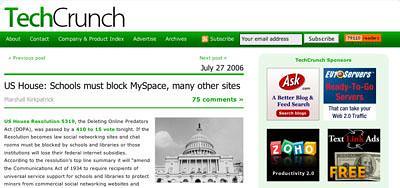Damming the Ocean!
US House Resolution 5319, the Deleting Online Predators Act (DOPA), was passed by a 410 to 15 vote tonight. If the Resolution becomes law social networking sites and chat rooms must be blocked by schools and libraries or those institutions will lose their federal internet subsidies.
Techcrunch » Blog Archive » US House: Schools must block MySpace, many other sites
This American move could have a huge impact on Canada, and the world, and the Web, but I think they are simply trying to dam the ocean. It's too late. And it's totally ironic.
It's Too Late
Pandora's Box has been opened, the genie is out of the bottle, this new semiosis will not be stopped, as long as there's electricity, computers, and networks. If/When those are destroyed, we'll have more to worry about than MySpace!
It's Totally Ironic
Guess who created the ancestor of the Web? The American military during the Cold War, wanted a way to make sure they could keep controlling their fighting forces even if all major cities were wiped out, so they created ARPANET, and from ARAPANET came the Internet, followed by Tim Berners-Lee's development of a visual interface, and, thus, the World Wide Web, and, currently Web 2.0, the Read/Write or Social Web, where the fearful MySpace is located.
Net Neutrality and the American Internet Regulator
The video, with sound, will start to play after you click - almost 5 minutes - on YouTube and Jon Stewart - It's funny, but it's terrifying because the people making the rules appear to know so little.
Net neutrality, BTW, is a different issue than DOPA - it's the attempt of commercial interests to make the Web less democratic, to set up a two-tiered, or multi-tiered system where some sites would be less available than others depending on your service providers whims, or business deals. And this could affect Canada directly too, as Michael Geist has pointed out:
Websites, e-commerce companies, and other innovators have also relied on network neutrality, secure in the knowledge that the network treats all companies, whether big or small, equally. That approach enables those with the best products and services, not the deepest pockets, to emerge as the market winners.Internet users have similarly benefited from the network neutrality principle. They enjoy access to greater choice in goods, services, and content regardless of which ISP they use. While ISPs may compete based on price, service, or speed, they have not significantly differentiated their services based on availability of Internet content or applications, which remains the same for all.In short, network neutrality has enabled ISPs to invest heavily in new infrastructure, fostered greater competition and innovation, and provided all Canadians with equal access to a dizzying array of content.
Michael Geist - The Search for Net Neutrality
But I digress.
To Learn More About DOPA, go here -
and find this section and read the links
I’m not the best person to analyze this though. Here’s who I recommend:
- Declan McCullagh at ZDNet has posted a very thorough background article on DOPA.
- Andy Carvin writes Learning Now, a blog about education and technology for PBS, and has set up a page called DOPAWatch to aggregate blog posts on the topic.
- danah boyd is probably the web’s leading expert in analyzing the politics of MySpace and youth social networking.
- Will Richardson’s Weblogg-Ed is a great source for all things Learning 2.0
- Vicki A. Davis is a Christian school teacher in Georgia who uses blogs, wikis, podcasting and more in her classrooms. Vicki has written a number of powerful posts on DOPA
Techcrunch » Blog Archive » US House: Schools must block MySpace, many other sites
The most important communication development since the printing press, maybe even since the creation of writing, is being threatened! The most significant education tool is being blocked because some people misuse it. Why not ban cell-phones instead, because way more people misuse them!
What Is Needed
People of all ages need to learn how to use the Web safely and intelligently, because it isn't going to go away. The older and/or less Web-aware need to learn more about how it works and what it can do for them. The younger and supposedly Web-adept (but often strangely Web-naive) need to learn about b.s. detection (academically known as critical thinking) and privacy-protection. IMHO.
technorati tags:TechCrunch, DOPA, Net_Neutrality, Geist, Web
Blogged with Flock


No comments:
Post a Comment